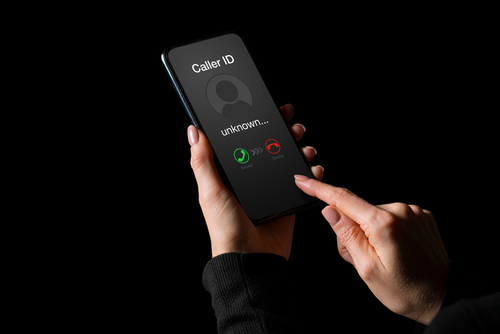

Regulator calls for evidence on innovative solutions to disrupt UK mobile number spoofing from abroad and mobile messaging scams
Phone companies will have to identify andblock calls from abroad under strengthened industry guidance introduced by Ofcom to protect the public from scam calls.
Current rules do not require operators to block all calls from abroad with +447 numbers so that genuine calls from UK callers roaming abroad are not blocked.
BT says has stopped a million calls per day from entering its network within the first month of implementing anti-spam measures
Ofcom is analysing the effectiveness, costs, risks and timescales of different technical solutions to tackle scam calls from abroad which spoof UK mobile numbers.
Ofcom says consumers are still receiving suspicious calls and texts. But there are signs of a decline in suspicious calls or texts.
In 2024, just under half of UK landline users said they’d received a suspicious call in the last three months, down from 56 per cent in 2021.
Mobile users also reported a decrease in receiving suspicious calls, from 45 per cent to 39 per cent over the same period. The incidence of suspicious text message has also fallen from 74 per cent in 2021 to 56 per cent in 2024.

“Scammers are constantly looking for new ways to contact people and to evade existing disruption measures. To continue our work on deterring mobile messaging scams, a second Call for Inputs, published today, sets out our understanding of the market including new analysis of how scams are perpetrated within it, and evidence on the current scale of the problem – including highlighting areas where data gaps .remain” said Lindsey Fussell, Ofcom’s Group Director for Networks and Communications.
Distress and financial harm
“Criminals who defraud people by exploiting phone networks cause huge distress and financial harm to their victims. While there’s encouraging signs that scam calls and texts are declining, they remain widespread and we’re keeping our foot to the throttle to find new and innovative ways to tackle the problem.

“Under our strengthened industry guidance, millions more scam calls from abroad which use spoofed UK landline numbers will be blocked, with similar plans underway for calls which spoof UK mobile numbers. We’re also challenging the industry and other interested parties to provide evidence on the best solutions to tackle mobile messaging scams:.
mistrust around answering phone calls
Ernest Doku, telecoms expert at Uswitch.com, added:
“With increasing mistrust around answering phone calls, consumers will welcome this development. Almost two thirds of Brits don’t answer the phone due to concerns about scams or scam callers. Ofcom’s six-month timeline may mean a delay before we see a reduction in these types of phone scams, as the deadline for these stricter measures to be implemented isn’t until the end of January.

“Recent changes from providers such as EE and VMO2 to reduce the impact of scam calls show that this issue is being taken seriously. The devastating impact of scam calls can be emotional as well as financial. Ofcom must continue to prioritise the safety of consumers and ensure this six-month implementation deadline is met by all providers”.







